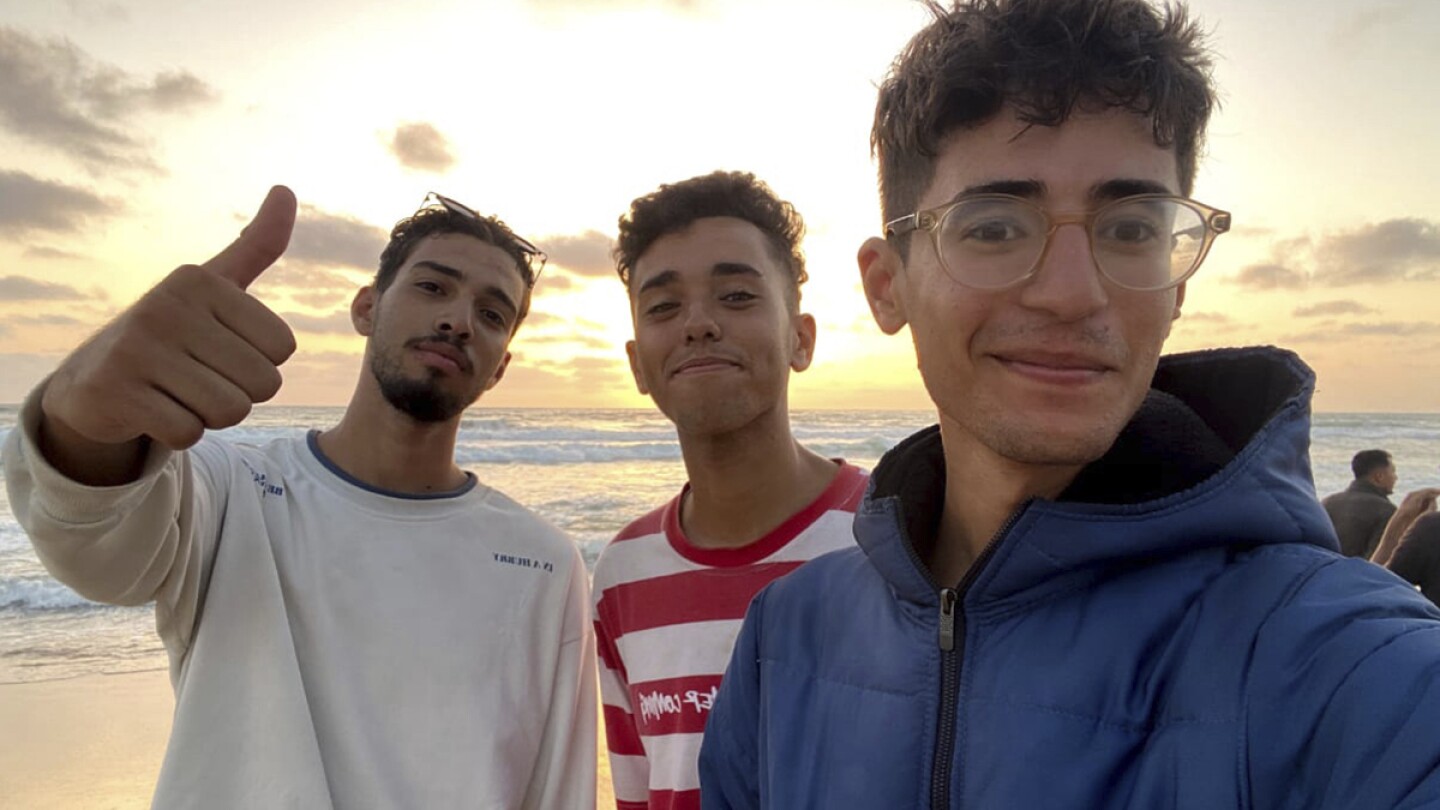CAIRO (AP) — It was another day of war in Gaza, another day of what 19-year-old Palestinian TikTok star Medo Halimy called his “Tent Life.”
As he often did in videos documenting life’s mundane absurdities in the enclave, Halimy on Monday walked to his local internet cafe — rather, a tent with Wi-Fi where displaced Palestinians can connect to the outside world — to meet his friend and collaborator Talal Murad.
They snapped a selfie — “Finally Reunited” Halimy captioned it on Instagram — and started catching up.
Then came a flash of light, 18-year-old Murad said, an explosion of white heat and sprayed earth. Murad felt pain in his neck. Halimy was bleeding from his head. A car on the coastal road in front of them was engulfed in flames, the apparent target of an Israeli airstrike. It took 10 minutes for an ambulance to arrive. Some hours later doctors pronounced Halimy dead.
“He represented a message,” Murad said on Friday, still recovering from his shrapnel wounds and reeling from the Israeli airstrike that killed his friend. “He represented hope and strength.”
The Israeli military didn’t respond to a request for comment on the strike.
Tributes to Halimy kept pouring in on Friday from friends as far afield as Harker Heights, Texas, where he spent a year in 2021 as part of a U.S. State Department initiative that sends students from around the world to American high schools.
“Medo was the life of the hangout … humor and kindness and wit, all things that can never be forgotten,” said Heba al-Saidi, alumni coordinator for the U.S. government-sponsored Kennedy-Lugar Youth Exchange and Study program and a friend of Halimy’s. “He was bound for greatness, but he was taken too soon.”
His feed was also flooded by hundreds of thousands of posts from his TikTok followers, expressing grief as if they, too, had lost a close friend.
Israel’s campaign in Gaza — sparked by Hamas’ Oct. 7 attack on Israel that killed 1,200 people and resulted in about 250 people taken hostage — has produced a torrent of images numbingly familiar to viewers around the world: Bombed-out buildings, contorted bodies, chaotic hospital halls.
The war has killed more than 40,000 Palestinians — according to Gaza’s Health Ministry, which doesn’t say how many of the dead were militants — and spawned a humanitarian disaster. It has also transformed legions of ordinary teenagers, who have nothing to do every day but survive, into war correspondents for the social media age.
“We worked together, it was our kind of resistance that I hope to continue,” said Murad, who collaborated with Halimy on “The Gazan Experience,” an Instagram account where the friends answered questions from followers around the world trying to understand their lives in the besieged enclave, which is inaccessible to foreign journalists.
Halimy launched his own TikTok account after taking refuge with his parents, four brothers and sister in Muwasi, the southern coastal area that Israel has designated a humanitarian safe zone. His friends said they had fled Israel’s invasion of Gaza City to Khan Younis before fleeing the bombardment again earlier this year.
His content “came as a surprise,” said his friend, 19-year-old Helmi Hirez.
Turning his camera to the details of his own daily life in the enclave, he reached viewers far and wide, showing the maddening tedium of war largely left out of breaking news coverage.
“If you wonder what living in a tent is actually like, come with me to show you how I spend my day,” he told the camera during his first of many “tent life” diaries filmed from the sprawling encampment.
He filmed himself going about his day: waiting restlessly in long lines for drinking water, showering with a jar and a bucket (“there’s no shampoo or soap, of course),” scavenging ingredients to make a surprisingly tasty baba ganoush, the Middle East’s smoky eggplant dip (“Mama mia!” he marvels at his creation), and becoming very, very bored (“then I went back to the tent, and did nothing”).
Hundreds of thousands of people around the world were captivated. Over the past several months of war, Halimy’s videos went viral — some amassing more than 2 million views on TikTok.
Even when recounting tragedies (his grandmother died, he mentioned at one point in passing, because of Gaza’s acute medication and equipment shortages) or fretting over Israel’s pulverizing bombardment, Halimy’s friends said that he found salve in channeling his grief and anxiety into deadpan humor.
“Very annoying,” he says with an eye roll when the buzz of Israeli drones interrupts one of his TikTok recipe videos before getting back to cooking.
Hopping in the back of a crowded pickup truck bound to get to the central city of Deir al-Balah, he pauses to remark, “As you can see, the transportation here is not five stars.”
And when the sound of projectiles streaking through the skies over Gaza startles him, seeming to be alarmingly close by, he turns his camera back to a game of Monopoly. “We proceeded to play anyway,” he says, then frowns. “Anyway, I lost.”
In his last video, posted just a few hours before he was killed, he records himself scribbling in a notebook — the pages covered with black redaction bars — at the same internet cafe where the airstrike would later hit.
“I started designs for my new secret project,” he said in the same tone he always used, one part playful, one part serious.
___ Isabel DeBre reported from Buenos Aires, Argentina.

